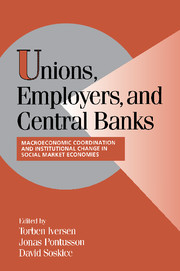6 - Institutional Dimensions of Coordinating Wage Bargaining and Monetary Policy
from Part II - Macroeconomic Regimes
Summary
Few propositions are more widely accepted today among policymakers and economists than the assertion that, by making its central bank more independent from the national government, a nation can secure better levels of economic performance. The financial press has concluded that “the argument for central bank independence … appears overwhelming,” and many nations have made their central banks more independent during the 1990's. Even the new monetary union now being established in Europe is organized around a central bank designed to be highly independent of political control (Goodhart 1995; de la Dehesa et al. 1993; Fratianni and von Hagen 1992; Gros and Thygesen 1992).
The argument for central bank independence rests on three pillars. First, a body of economic theory has been developed to explain why the independence of the central bank enhances economic performance (Persson and Tabellini 1994; Cukierman 1992). Second, several national cases are cited to support this view, of which the most prominent is the Federal Republic of Germany whose Bundesbank also provides the model for the new European Central Bank (Canzoneri, Grilli, and Masson 1993; Fratianni, von Hagen, and Waller 1992). Third, an influential set of empirical studies seems to confirm that, by making the central bank more independent, a nation can secure lower rates of inflation without any adverse economic effects (Alesina and Summers 1993; Grilli, Masciandaro, and Tabellini 1991).
The object of this chapter is to question the current consensus in favor of central bank independence. We proceed by examining each of the pillars on which the case for it rests, beginning with the theoretical rationale, following with a reconsideration of the German case, and concluding with the reanalysis of cross-national data. We close by discussing the implications for economic performance under the European Monetary Union.
Our analysis begins from the contention that monetary policy-making involves a signaling process between the central bank and economic actors. We argue (a) that the advantages of independence turn on the effectiveness of this signaling process and (b) that the effectiveness of the signaling process is conditioned, in turn, by the organization of the broader political economy and, most notably, the extent of coordination in wage bargaining. Although increasing the independence of the central bank will lower the rate of inflation, it will not always do so without adverse economic consequences.
- Type
- Chapter
- Information
- Unions, Employers, and Central Banks , pp. 173 - 204Publisher: Cambridge University PressPrint publication year: 2000

